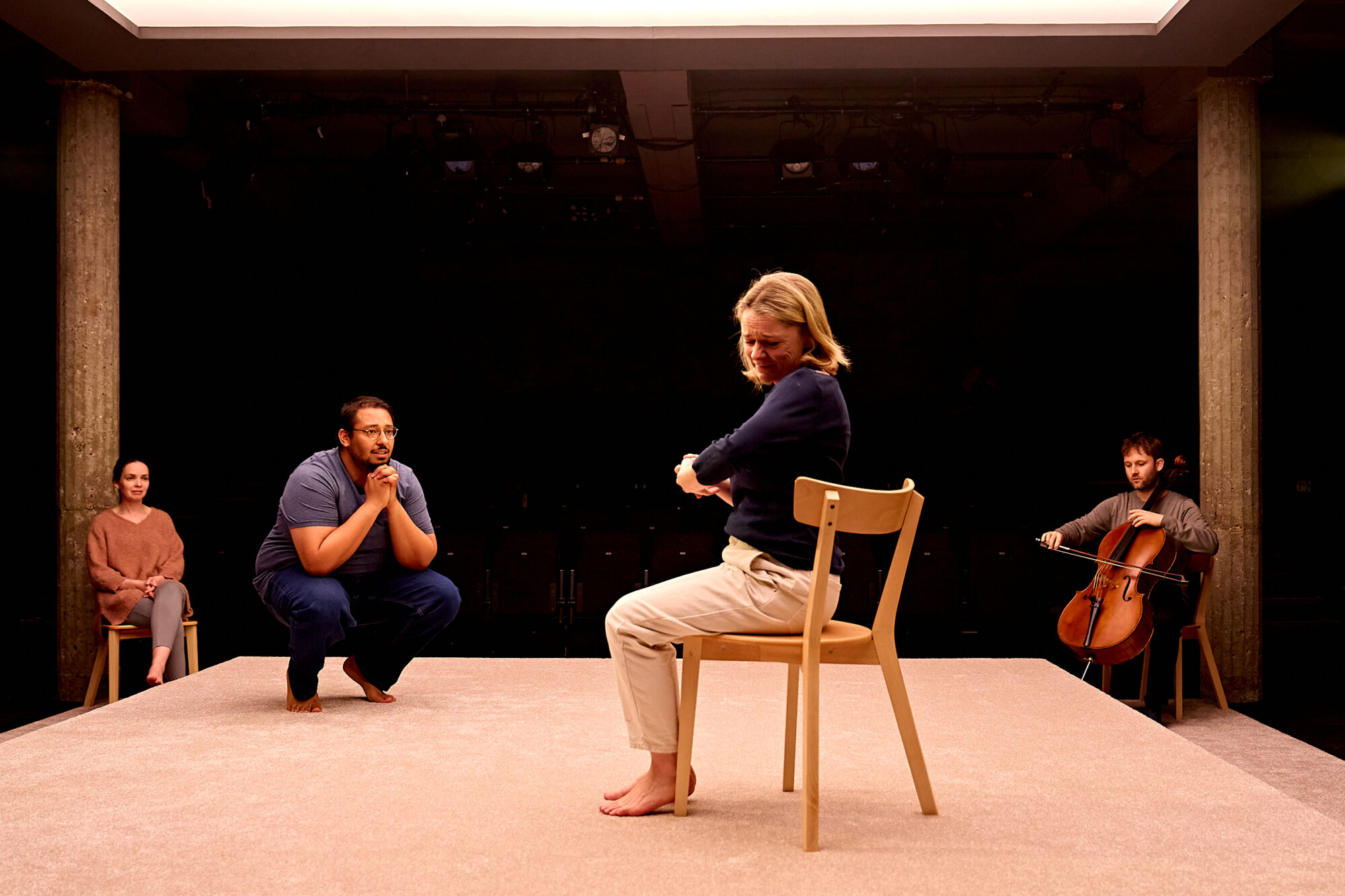Collaborating on The Cord: Dr Jess Heron & Bijan Sheibani
Thu 25 Apr 2024 |
Our Plays, The Bigger Picture
Dr Jess Heron, founder and CEO of National perinatal mental health charity, Action on Postpartum Psychosis (APP), and acclaimed writer and director, Bijan Sheibani, collaborated on research for his new play The Cord, that follows a family struggling to navigate the postpartum period.
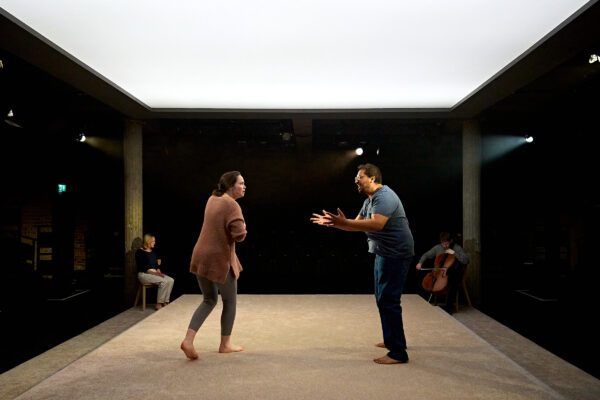
The company in ‘The Cord’ at Bush Theatre. Photo by Manuel Harlan.
“APP, which began as a research panel, now supports women and families affected by postpartum psychosis – not just as they navigate the tough recovery period, but over their lifetime”
Despite its shocking severity, women recover from postpartum psychosis. In the throes of illness, women and their families doubt this. Hallucinations, delusions, grandiosity, paranoias, debilitating confusion and crushing anxieties, can make mental health and mothering feel a distant hope. But, with treatment, support and time, women recover and become the mothers they wanted to be.
However, this is not the whole story. There are losses, sadness’s, lingering fears, scars and hidden stigmas which hunker, unspoken, in families – which have inter-generational on-costs. Hidden in the strata of functioning and loving families, PP leaves its mark.
APP, which began as a research panel, now supports women and families affected by postpartum psychosis – not just as they navigate the tough recovery period, but over their lifetime, as they parent toddlers and teenagers, consider further pregnancies, manage menopause, become grandparents. Today, women have better access to information, care, specialist health professionals and a massive lived experience community of women and families who support each other. The situation today is far removed from the shame, silence and stigma of decades past.
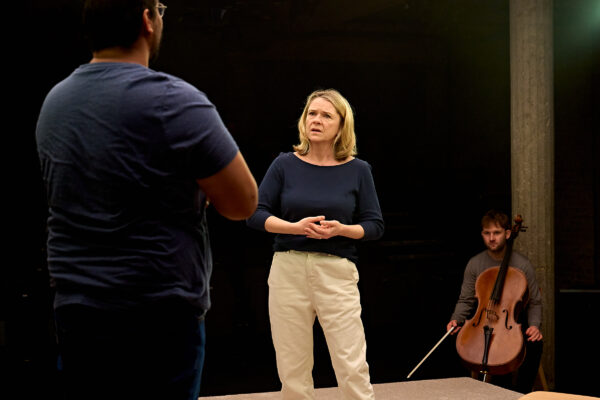
Irfan Shamji (Ash), Lucy Black (Jane) and Cellist Colin Alexander in ‘The Cord’ at Bush Theatre. Photo by Manuel Harlan.
We (Sheibani and Heron) set out to investigate the experiences of APP’s growing band of grandparents who experienced PP at a time when families hid the illness, and of the adult children of APP families, as they contemplate having their own children.
What we learned is many of the grandparents who talked to us explained how, late in life, they gained a better understanding of their own postpartum psychosis, as well as relief and solace through meeting others involved in APP.
“I was able to…give kisses to my grandson which had been denied to my son”
Grandparents described joy and excitement at becoming a grandparent. They looked forward to being supportive and loving; to having a warm relationship with a new baby “from the beginning”. During their postpartum psychosis, much of this joy was denied to them. Many were separated from their baby for the postnatal months, cared for in general adult psychiatric hospitals – often in mixed sex wards inappropriate for visiting babies. Having a new grandchild to cuddle and care for was seen as a chance to reclaim some of the losses stolen by the illness.
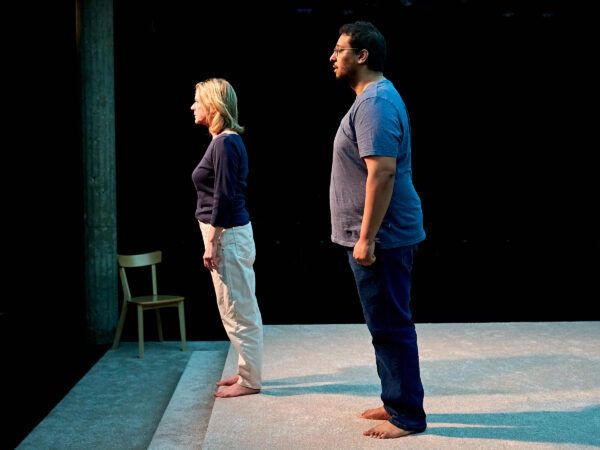
Lucy Black (Jane) and Irfan Shamji (Ash) in ‘The Cord’ at Bush Theatre. Photo By Manuel Harlan.
Most grandmothers expressed concern for their daughter, daughter in-law or son’s wellbeing in the postpartum period. Some had sought advice from APP and ensured that their experience of PP was included in their daughter’s medical notes. Others noted that their sons were worried for their partners’ well-being.
Some grandparents described an unexpected impact on their own mental health, re-living “disturbing memories of my own experience”; being “sick with worry and constantly anxious”. Some noted excitement more than anxiety, but where PP had then happened to a daughter, a grandmother who thought “she was coping…collapsed at work, had a never-experienced-before panic attack and took a while to…deal with the guilt”. For some, family rifts ensued – caused by the stresses and strains of the hinterland of postnatal mental illness. Thus, when a grandmother felt the need to warn and educate the family about PP, it was considered “interfering” by her already-anxious son.
Some grandmothers felt “privileged” to stay over and help support the new family. Many felt the joy of an immediate bonding or of being useful. Many described that the experience sat alongside loss and sadness. They described feelings such as “wanting to go back in time”; trying to mend estrangements; the triggering of unwelcome, intrusive thoughts; “overwhelming guilt [at the] neglect of my own son [during the illness]”; having “issues that I didn’t realise I had”. Some found the experience at once healing and painful “When on my own …I became emotional feeding the baby …this was the actual time period…I had been separated from my baby daughter”. “I was able to…give kisses to my grandson which had been denied to my son”.
“but looking back I needed it …I’d felt lonely and alone …but felt selfish for feeling that way”
Few gained formal support when they became grandparents; one saw a counsellor “for a couple of months [because of] my overwhelming feelings of love and anxiety towards my grandson”, several mentioned talking to partners and husbands for support, and others said their involvement with APP had helped. Others described wishing they has sought support: “but looking back I needed it …I’d felt lonely and alone …but felt selfish for feeling that way”. One grandmother found the fears and anxieties de-stabilising and ‘was hospitalised and under the mental health team”.
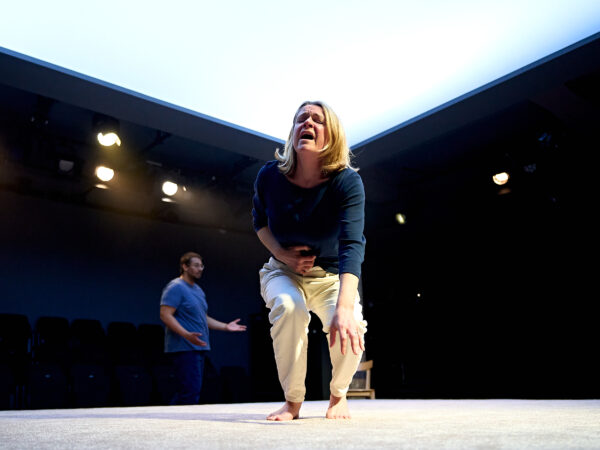
Irfan Shamji (Ash) and Lucy Black (Jane) in ‘The Cord’ at Bush Theatre. Photo by Manuel Harlan.
The underlying issue of trust and fear underpins many comments within the survey –partners scrutinising for “signs of the family weakness”; or stresses caused in marriages through balancing concerns about sharing grandchildren equally between both sets of grandparents. One granny noted: “My grandson is an absolute treasure” but the lingering legacy was that her son-in-law felt she was “watching like a hawk!”
Overall, mothers with PP who became grandparents say that they were “shocked” at the triggering of suppressed memories – of delivery suites; trauma; loss; reminders “of what my son missed out on”. Many found that a grandchild was a source of “joy and delight” and unexpectedly went some way to helping to heal some of the loss. “If PP has made you feel inadequate as a mother, becoming a grandparent can help heal…”. Such healing came from being needed, being able, trusted, accepted, and being present with a new baby.
The Cord is playing in the Holloway Theatre until 25 May. Find out more and book here.



